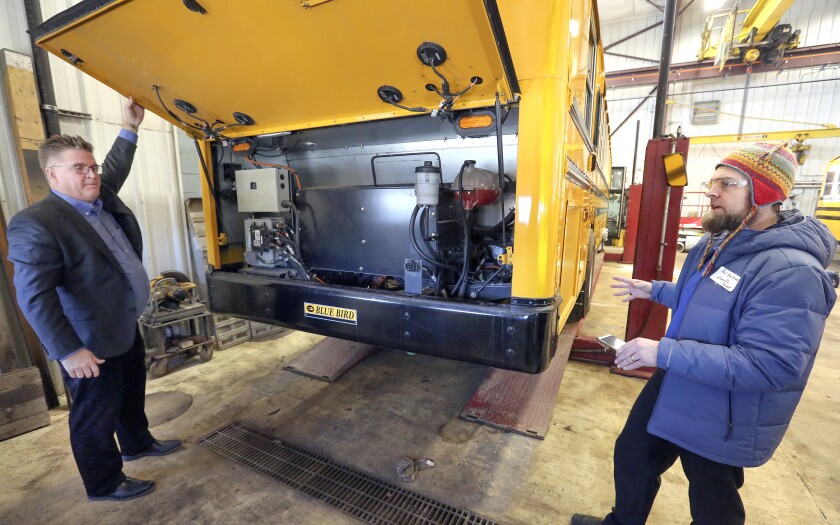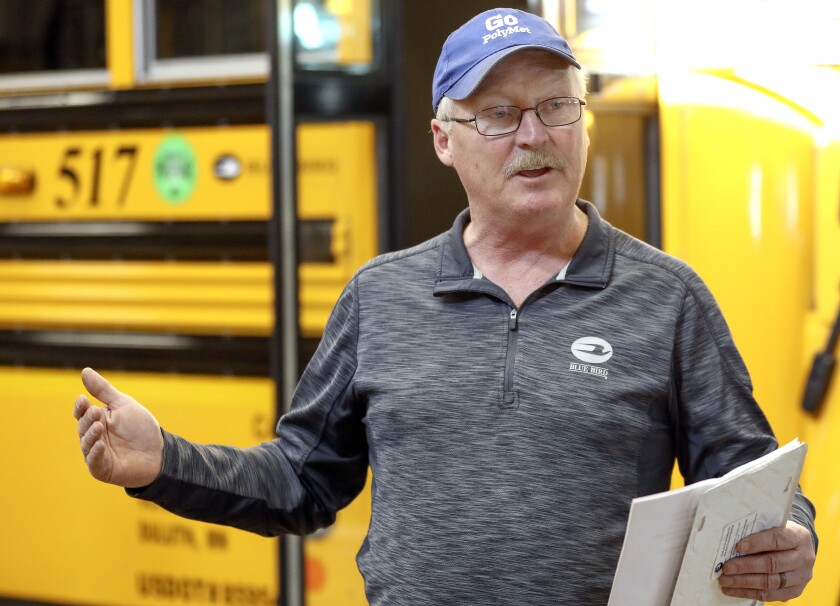During an electric school bus demonstration Wednesday in Hermantown, Kay Cornelius asked the questions on everybody's mind: How much does it cost, and "is it going to handle our weather and the corrosion belt we live in up here?"
The answers, from Jim Johnson, alternative fuels manager for the Macon, Georgia-based Blue Bird Corp., came readily: in the $350,000 range, and, not yet, but likely soon, within the next 1 to 1½ years.
"There is Volkswagen settlement money for electric vehicles and utility companies are joining in across the nation," Johnson said, addressing the cost. "I just came back from Iowa, where a utility company was fronting the whole bill."
Cornelius, the transportation director for St. Louis County Schools, and about a dozen peers from other districts took in Johnson's presentation at United Truck Body Co., Inc. on Miller Trunk Highway.
ADVERTISEMENT

Co-owner Tim Herstad deals Blue Bird buses to scores of Northland school districts — many propane-fueled, still a lot of diesel, some gasoline, and, likely soon, electrics.
"One manufacturer claims in 10 years the only thing they'll make is electric buses," Herstad said. "It perks your ears. The DTA is trying the Proterra electric buses right now, and if a few things change it could work well in our environment."
Blue Bird created its first electric bus in 1994, ahead of its time. The bus on display at United Truck Body featured 14 batteries encased in steel running under the length of the bus. It's 2,380 pounds of batteries capable of delivering 120 miles on a full charge.
The transportation directors pulled out their pocket flashlights and inspected the bus and its features as it was raised on a lift.
"I really like it," said Steve Johnson, manager of transportation for the Duluth school district. "I wish the price point was lower, but that will come down in time. I love the clean tech."
He also said he appreciated the immediate torque electrics deliver when the accelerator is pressed. Diesels lag for a moment, he said.
ADVERTISEMENT

Jim Johnson described an array of technical details for his audience, and also how, because electrics run quietly, the driver can hear all the way to the back of the bus. The key for electric school buses in the Northland will be keeping the batteries warm in cold weather — an issue because not every school district has warm storage for their buses.
While the buses will charge at any temperature, the Blue Bird rep said, the state of the charge diminishes more quickly the colder the battery is — just like your smartphone. Optimal temperature is 60-80 degrees.
But solutions are coming as the the technology advances quickly. Johnson, the Blue Bird rep, recommended that a district ought to start with one electric bus in its fleet. Doing so creates opportunities to partner with utility companies, and makes a district poised for even newer developments and opportunities, he said. Soon, the buses will even have vehicle-to-grid capability.
"When they're parked, they can pull the charge out and feed the grid," Herstad said. "It's basically a pool of electricity."







